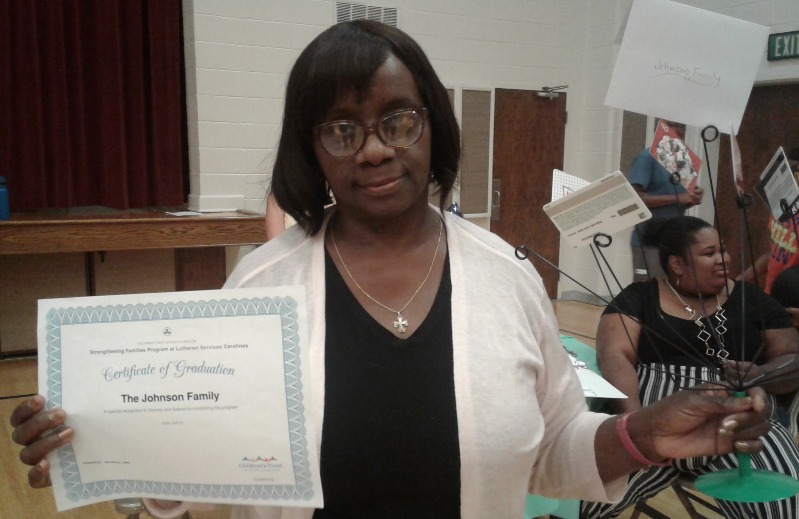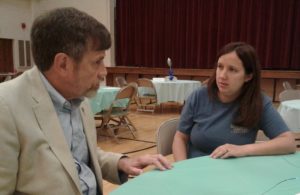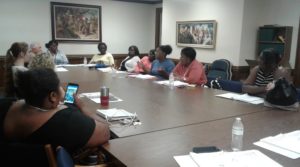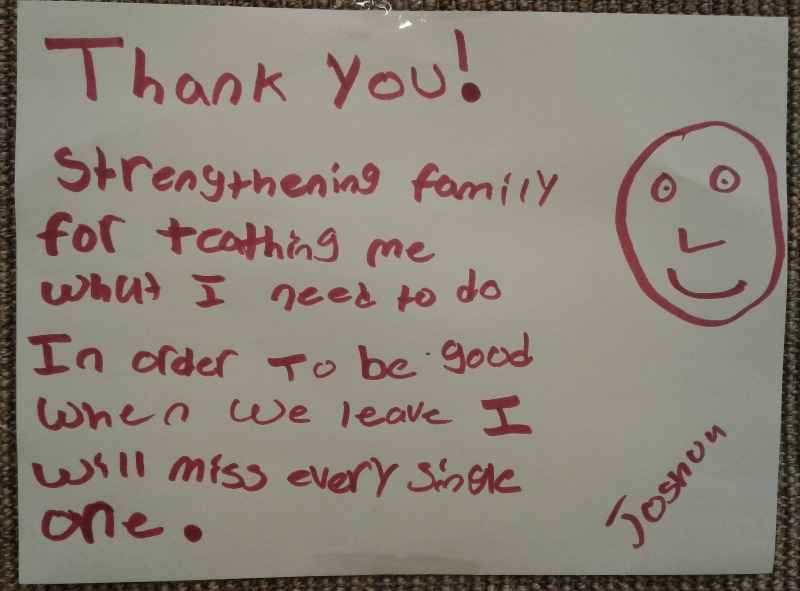As part of an expansion of the Strengthening Families Program around the state in the new year, Lutheran Services Carolinas held its first cycle for families this spring in the Charleston area. Neil White, who tells the stories of Children’s Trust, covered the graduation event.

Dolores Johnson holds her graduation certificate and money tree of gifts cards that designate her successful completion of the program.
CHARLESTON – Dolores Johnson didn’t want to leave the Strengthening Families Program (SFP).
She was determined to finish the 14 weekly sessions delivered through Lutheran Services Carolinas even though her foster child was placed in another home after she began the program. SFP requires a parent or caregiver to have a child between the ages of 6 to 11 to enroll and take part in the lessons that help families develop positive discipline practices, stay resilient in tough times, and improve parent-child communications skills.
But Johnson saw the value she was receiving from the parental and full group sessions, and she wanted to keep coming each week even when her foster child left after the fourth week. Lutheran Services Carolinas (LSC), a new grantee of Children’s Trust in the Charleston area, allowed her continued participation.
“She’s a foster parent, and she saw it as a way to enhance her ability to work with children in her home,” said Julie Hood, director of child services at LSC. “These kids do come and go, and that’s a reality when we work with DSS families and foster parents.”
As it turned out, an 11-year-old girl was placed with Johnson in the sixth week of SFP, which gave her an opportunity to apply her new skills again. The two reached the finish line in early June, when Lutheran Services Carolinas held its graduation ceremony at the end of the 14-week cycle, which was held each week at the Church of Jesus Christ of Latter-day Saints.

A celebratory cake was served to the program’s eight graduating families.
“It was a success. They did well,” Hood said. “Dolores realized these skills would help her stabilize this kid in her home. She’s doing great. It has really helped, and they’ve enjoyed it.”
The program, which also assists children with social skills, relationships, and school performance, was launched by Children’s Trust in 2014 with four sites. SFP has now expanded to 24 providers implementing in 27 counties through funding from The Duke Endowment and the S.C. Department of Social Services.
Johnson is convinced the program will help her as she continues to provide a home to children in need, especially those who arrive with behavioral issues.
“I’m using the training that I got, and it is already helping me a lot with the children that I’m seeing in my home. I went through some struggles with a couple of kids I’ve had in my home, but now I’m being more calm and having more patience,” Johnson said. “I wanted to get more experience. If I have a power struggle in my house, I’ve learned how to take care of the situation in a calm way. I control my temper and try to make the situation a better one. Kids come in with all kinds of problems, and I try to get them the help they need.”
She smiled when discussing her newest child, who has fit into her home and also embraced the lessons of SFP.
“This child is like a little angel,” Johnson said. “I’m still getting to know her.”

Lee Porter of Children’s Trust and Sara Ramsey of Lutheran Services discuss the strides made by the staff and families over 14 weeks of SFP.
Sara Ramsey, the SFP site coordinator and the lead clinical specialist for Lutheran Services Carolinas office in Charleston, has seen the progress both have made, saying the program has given Johnson “a different perspective on how to do things.” Ramsey also watched Johnson’s newest charge step right into the program.
“She’s very open to it and took to the information really well,” Ramsey said.
Each of the eight graduating families took to the program as well. They came to trust the SFP staff assembled by the Lutheran Services Carolinas. Each two-hour session included a family meal before splitting into parenting classes and child classes. All of them came together again as a group for practicing new skills at the end of the evening.
Ramsey called the first cycle for the organization “a good experience and definitely a learning experience.” She loved where the program guided the families each week and the camaraderie that developed between the families over the program’s course.

Parents and caregivers meet to discuss the final session’s lesson under the guidance of a group leader from LSC.
“The best part is meeting the needs for these families,” she said.
Hood can’t wait to get the next cycle going in the fall, when more families can discover the skills and resources that can help them build stronger bonds and develop positive interactions that prevent child abuse and neglect.
“Overall, we saw more togetherness among the families. When they sat together, there was more communication,” Hood said. “The cohesiveness of the family units has definitely improved. And they’ve loved it. I’m amazed at the positive remarks.”
Lee Porter, chief program officer at Children’s Trust, attended the graduation and got the opportunity to observe the positive dynamic between the staff and families.
“Lutheran Services staff should be commended for including a broad cross-section of parents in SFP – traditional two-parent families, single parents, grandparents who are parenting again, and foster parents,” Porter said. “I have never seen such a good representation of experienced foster parents recruited by an organization delivering its first cycle of SFP. It is a setting where foster parents can be refreshed and connect the richness of their experiences to the collective learning.”





